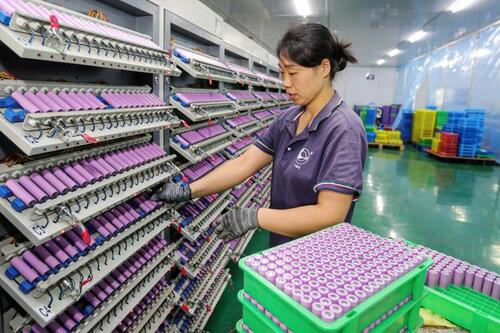Europe’s Leaders Have Come Under Domestic Pressure To Follow The American Lead On China Trade
Authored by Milton Ezrati via The Epoch Times,
Washington’s aggressive posture on China trade has grabbed most media attention these days—the imposition of high tariffs on Chinese goods, the threat of even higher levies, restrictions on high-technology exports to China, and incentives for businesses to source domestically.
Europe’s leadership has expressed concerns about China trade and has taken some steps to limit what they see as its ill effects but so far has proceeded along much more tactful and modest lines than have the Americans.
Of late, however, European business leaders have begun to pressure leadership at the national and EU levels to up their game with China. These business leaders point to the American example as a model. China’s top officials have no doubt taken note, realizing that a change in Europe’s approach will make it that much more difficult for them to face already severe domestic economic challenges and relentless pressure from Washington.
Within the European business community, the vanguard in this push seems to have emerged in the auto sector, especially companies with ambitions to build electric vehicles or support such an effort. These businesspeople claim to see no practical result from recent promises from European Commission President Ursula von der Leyen to “promote domestic production to avoid strategic dependencies, especially for batteries.”
Despite this promise, many that the Europeans designate as original equipment manufacturers still face what they describe as ongoing and relentless pressure from cheaper Chinese products, from steel to whole batteries. They complain that the European Union’s strategy to reduce reliance on China—the Critical Raw Materials Act of 2024—is simply too weak.
This business-based pressure has pointed to American actions as preferable. European business leaders hold up the U.S. Inflation Reduction Act as far superior to what the EU officials have offered. It, they say, has a local-content policy that sticks, with strict amounts of local content written into the law and penalties for companies that fail to meet the explicit standard.
In Europe today, they claim, there is no cost to choosing a Chinese source over a European one. If a company buys raw materials from China instead of a European source, nothing happens. These business leaders advocate tax incentives for domestic European producers and temporary tariffs on imports from China.
Especially outspoken in this matter is the German boss of AMG Lithium, Stefan Scherer. His passion is understandable. His lithium battery plant in Bitterfeld-Wolfen is Europe’s first lithium hydroxide refinery and is in direct competition with China’s much more mature battery production effort.
Though exuding confidence in the prospects for his company’s success, as any corporate executive would, Scherer has nonetheless advocated strenuously for a more forceful EU strategy to safeguard investments in European resources for the long term. Without such a strategy, he has claimed with great drama, Europe might as well “apply to be a province of China.” Europe today, he argues, is at a “tipping point” and requires “a complete change of global relationships.”
No doubt Beijing is monitoring this pressure and is far from pleased. It already has its hands full with China’s seemingly intractable domestic economic problems—the ongoing property crisis, the paucity of private investment in hiring and expansion, and a household sector that seems immune to any efforts to get it to increase its spending.
Beijing also faces a Washington that can only be described as belligerent; that has limited the sale of high technology products to China; that, as European business leaders have pointed out, has actively encouraged domestic sourcing; and that has already imposed high tariffs on Chinese products coming into the United States and threatening still more levies.
If the Europeans follow suit, as European businesspeople seem to want, China will face still more economic difficulties than it already does, half again as many as those it faces today.
Views expressed in this article are opinions of the author and do not necessarily reflect the views of The Epoch Times or ZeroHedge.
Tyler Durden
Fri, 09/19/2025 – 03:30ZeroHedge NewsRead More





 R1
R1
 T1
T1


